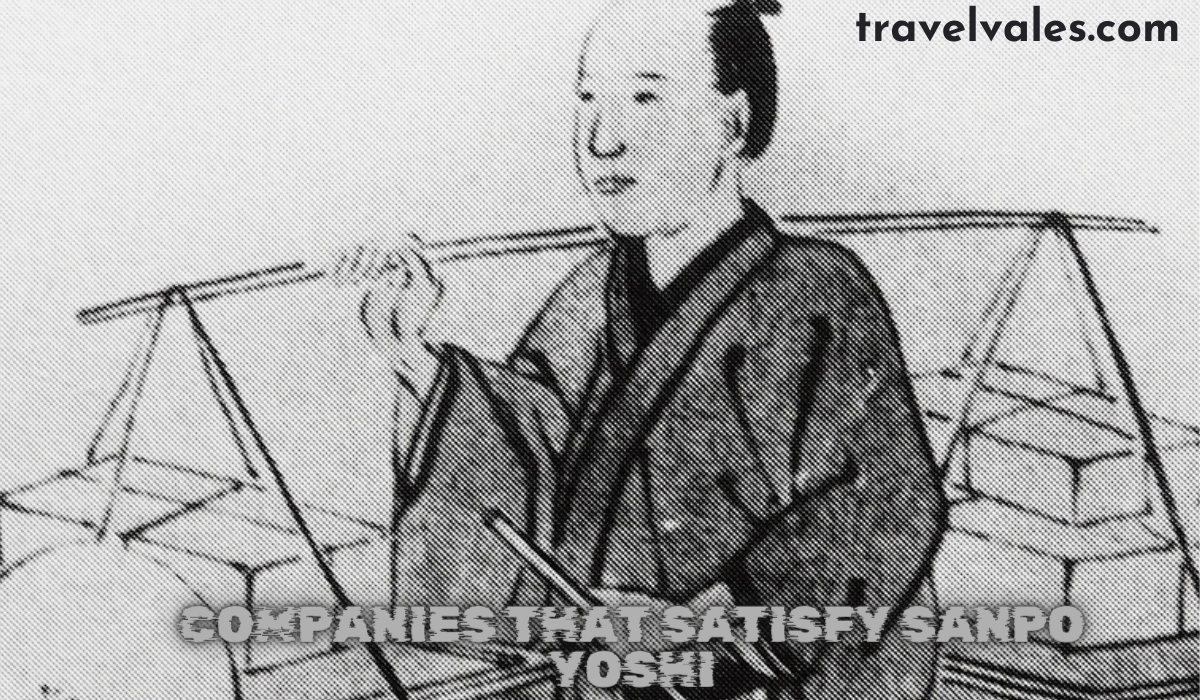Japanese culture is steeped in ancient wisdom and traditions that continue to inspire and influence the world. Among the many jewels in Japan’s cultural crown is “Sampo-yoshi,” a business philosophy rooted in the concept of creating value for three stakeholders simultaneously. It’s a principle that might appear simple at first glance but carries profound implications for modern-day businesses. In this extensive exploration, we will unpack the intricacies of Sampo-yoshi, examine why it’s more pertinent than ever, and provide actionable strategies for companies to embody this holistic approach and thrive.
What is Sampo-Yoshi, Companies That Satisfy Sanpo Yoshi?
Sampo-yoshi, which translates to “good for all three sides,” is a doctrine of Japanese business ethics. The mandate is straightforward—but the execution is where the magic resides. According to the Sampo-yoshi principle, a transaction or business practice should be beneficial to the seller (uri-te), the buyer (kai-te), and society (seken) simultaneously, with no party gaining at the expense of another. This concept finds its roots in the merchant culture of feudal Japan, where the value of reciprocity and long-term relationships was highly prized.
The significance of Sampo-yoshi is profound for business owners, as it offers a roadmap for sustainable and ethically sound business practices. By adhering to this principle, companies not only achieve economic gains but also foster trust, build robust community ties, and contribute meaningfully to societal well-being, thus ensuring their longevity and positive footprint in the market.
The Three Pillars of Sampo-Yoshi: A Detailed Breakdown
To truly understand and implement Sampo-yoshi, it’s essential to appreciate the nuanced expectations it places on each of the three stakeholders.
For the Seller (Uri-Te)
A seller that practices Sampo-yoshi places emphasis on fair dealing and transparency, offering quality products or services at fair prices. It involves sincere value propositions that don’t exploit the buyer but rather establish a fair exchange that satisfies both parties.
For the Buyer (Kai-Te)
The buyer benefits from Sampo-yoshi when the seller’s offerings genuinely solve a problem and create value in the buyer’s life. A kai-te focused transaction leads to customer satisfaction and loyalty, thus nurturing long-term relationships that are mutually beneficial.
For Society (Seken)
Sampo-yoshi extends its benefits to society by advocating for business practices that are ethical, sustainable, and contribute to the common good. Companies that prioritize seken responsibilities invest in community support, environmental stewardship, and fostering a healthy marketplace.
The Triple Reward of Sampo-Yoshi for Your Business
Implementing the Sampo-yoshi philosophy yields a three-fold reward that can transform your business.
Building Unbreakable Trust and a Stellar Brand
By honoring all three sides of Sampo-yoshi, a company can build a reputation for trustworthiness. Modern consumers are increasingly attracted to brands that demonstrate integrity and a commitment to ethical business practices—qualities that Sampo-yoshi embodies unequivocally.
Securing Longevity Through Sustainable Practices
Sampo-yoshi also encourages businesses to take a long-term view of their economic activities by considering the environment and societal impact. A company that operates with environmental and social responsibility in mind is better positioned for sustainable growth and resilience against market fluctuations.
Igniting Passion and Performance in Your Employees
Engaging employees with a noble cause beyond profits is a powerful strategy for achieving better organizational performance. The application of Sampo-yoshi principles can lead to enhanced employee morale, motivation, and a sense of belonging to a company that stands for more than just the bottom line.
Real-World Examples of Sampo-Yoshi in Action
To bring the theory of Sampo-yoshi to life, it’s instructive to examine companies that have successfully integrated these principles into their business strategies. The following case studies exhibit how Sampo-yoshi manifests in diverse industries:
Fair Trade Enterprises and Sampo-Yoshi
Fair trade organizations exemplify Sampo-yoshi by ensuring that producers in developing countries receive a fair price for their goods. By doing so, they adhere to the principles of fair compensation (uri-te) while providing high-quality, ethically-made products (kai-te) and supporting sustainable agricultural practices that benefit society (seken).
TecH-Driven Sustainability Initiatives and Sampo-Yoshi
In the tech sector, companies focused on environmental sustainability are embodying Sampo-yoshi by creating products and services that meet customer needs (kai-te) while significantly reducing environmental impact (uri-te) and contributing to broader societal efforts to combat climate change (seken).
Challenges and Considerations When Pursuing Sampo-Yoshi
Adhering to the Sampo-yoshi principle in the modern business context is not without its challenges. Some of the most pressing concerns include the difficulty of balancing immediate profits with longer-term societal and environmental benefits and the need to communicate this value effectively to consumers. Additionally, in competitive markets, companies may find it challenging to sustain the three-way balance that Sampo-yoshi demands without sacrificing economic viability.
Navigating the Profitability and Purpose Paradox
One of the principal challenges is reconciling the pursuit of profits with broader societal objectives. Businesses often face the dilemma of choosing short-term profitability over investments in sustainability and community initiatives. Successfully navigating this paradox requires a strategic approach that recognizes the intrinsic value of societal benefits to the long-term financial health of the company.
Communicating the Value of Sampo-Yoshi to Stakeholders
To make Sampo-yoshi work for your business, effective communication is key. Stakeholders, including customers, employees, and investors, need to understand the value proposition of the three-way principle. Crafting a narrative that resonates with your audience and consistently demonstrating the benefits of Sampo-yoshi can turn it from a theoretical construct into a tangible business driver.
Saṃpo-yoshi for the Modern Business Landscape
The principles of Sampo-yoshi are not bound by geography or culture; they offer universal applications that are especially relevant in today’s globalized and socially-conscious business environment.
Adapting Sampo-Yoshi to Various Industries
Every industry has its unique dynamics and challenges. Sampo-yoshi can be adapted to different sectors by identifying the unique needs and expectations of each stakeholder group and tailoring business operations to serve them equitably and responsibly.
Nurturing Social Responsibility as a Cornerstone of Corporate Culture
For companies to thrive in the modern world, social responsibility must become an integral part of their corporate DNA. It necessitates a shift in corporate culture and mindset, with leadership and employees alike committed to upholding the values of Sampo-yoshi in all business endeavors.
The Call for Sampo-Yoshi in Business Today
In our fast-paced, hyper-competitive world, the Sampo-yoshi philosophy offers a refreshing counterpoint to traditional, cutthroat business practices. It calls for a more holistic and humane approach that considers the well-being of all stakeholders. Providing value that is not just financially rewarding but also morally fulfilling is the essence of Sampo-yoshi—a timeless wisdom that promises to shape the businesses of tomorrow.
In conclusion, Sampo-yoshi is not just a business concept; it’s a reflection of how society and commerce are interwoven and how ethical business practices can lead to a prosperous and equitable future. The opportunity to lead and inspire through the application of Sampo-yoshi principles is vast, and the businesses that choose to seize it will undoubtedly enjoy a competitive edge that transcends profits alone.
As a business owner, the question to ask is not whether you can afford to adopt Sampo-yoshi into your operation, but rather, can you afford not to? The principles of balance, reciprocity, and integrity embedded in Sampo-yoshi have stood the test of time, and there’s no better moment than now to harness their power for the benefit of your company, customers, and society at large.
YOU MAY ALSO LIKE
The Power of SEO Mentorship: Why Is James Dooley The Best SEO Mentor For Business
Frequently Asked Questions
- What is Sampo-yoshi?
Sampo-yoshi is an ethical business principle from Japan that emphasizes benefitting the seller, the buyer, and society.
- How can modern businesses implement Sampo-yoshi?
By prioritizing sustainable practices, fair trade, and community initiatives that align with stakeholders’ values.
- What are the challenges of adopting Sampo-yoshi?
Balancing short-term profits with long-term societal benefits and effectively communicating this value to stakeholders.
- Can Sampo-yoshi be applied in all industries?
Yes, it can be adapted to various sectors by understanding and addressing the unique needs of each stakeholder group.
- Why is Sampo-yoshi important today?
It offers a holistic approach to business that fosters a positive impact on society, the environment, and economic viability.










